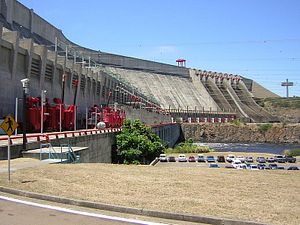In June 2018, UNDP Pakistan released its Water Security Report, setting off alarm bells in the country. The possibility of Pakistan facing an acute water shortage by 2025 became the basis for numerous contingency efforts, including a judiciary-led donation fund for Bhasha Dam and Imran Khan’s plea for overseas support.
But the most integral component to Pakistan’s water capacity-building – the Kalabagh Dam project – was once again denied due consideration.
The World Bank-backed 3,600 megawatt hydroelectric power plant invited strong resistance from provincial parties, who cited differences over water share and international involvement.
Similar challenges once surrounded Venezuela’s Guri Dam, a 10,235MW hydroelectric power plant in the state of Bolivar. But the adoption of three success strategies helped the Venezuelan government in fostering grassroots consensus, overcoming loan dependency, and resolving water distribution vows. These are strategies that present valuable remedies for resolving Pakistan’s long-standing Kalabagh dispute.
Firstly, the government of Venezuela set up the Electrificación del Caroní CA (EDELCA). It was a decentralized state-owned enterprise, which played a pivotal role in bringing divergent stakeholders together from multiple sectors of Venezeula’s economy.
Under this platform, turbine contractors and dam-construction consortia joined forces with equipment manufacturing specialists. These mergers proved instrumental in determining the degree to which the Caroni river – Venezuela’s equivalent of Pakistan’s Indus river – was to exploited for Guri’s hydroelectric use.
Since Kalabagh’s design was met with hostile opposition from Sindh and Khyber Pakhtunkhwa provinces, a similar multi-sectoral committee could be leveraged to mend technical and political differences. The absence of stakeholder engagement has prompted key actors, such as the Pakistan People’s Party-led Sindh government, to move resolutions against the dam, and declare it a threat to economic growth.
Secondly, Venezuela implemented a “phase-wise construction” technique to limit the role of international organizations and empower domestic contractors. During the project’s planning stage, the Venezuelan government acquired a one-time loan of $85 million from World Bank. This sum was used to constitute EDELCA, which was authorized to takeover Guri’s second phase operations from World Bank.
A competitive bidding process made it possible to engage national companies during the construction phase. The process took over 70 indigenous companies on board, including construction giant HPC Venezuela.
It is imperative for Pakistan to follow Venezuela’s “phase-wise construction” approach, given how World Bank’s involvement in Kalabagh’s planning stages has driven public distrust. The government’s ownership of the construction phase could help expand the role of domestic contractors in Pakistan and ameliorate their skepticism towards foreign involvement.
Finally, the Venezuelan government had set up a hydro-meteorological forecast center to diagnose any potential threats to the dam site. The mechanism generates hydrological, meteorological and climatology-oriented forecasts, in an effort to eliminate environmental risks associated with the power plant.
The framework is of particular relevance to Kalabagh, since it lies along two fault lines – the Kalabagh Fault and the Khariwan Fault. To minimize chances of stored water leakage during lean periods, it is crucial for Pakistan to integrate this design into a broader risk and disaster management strategy — one that is aimed at matching developmental goals with Kalabagh’s environmental constraints.
In light of the strategies employed by Venezuela, the resolution of Pakistan’s Kalabagh water dispute calls for joint ownership, stakeholder collaboration, and water prediction models – all within the current policy discourse. The onus is on Imran Khan’s leadership to realize Kalabagh’s utility to Pakistan’s water conservation efforts, and treat it’s revival as a matter of national interest.
Hannan Hussain is an Islamabad-based writer for Daily Times, DAWN and the Express Tribune. He is also the author of And the Candles Blew.

































